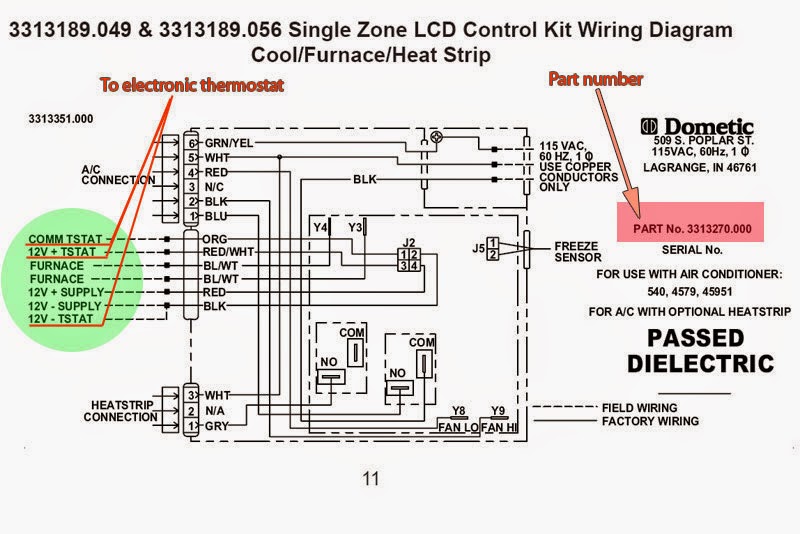RV Climate Control: Dometic Thermostats Decoded
Ever been stuck in a sweltering RV, dreaming of an arctic blast? Or shivering in your mobile home, wishing for a touch of the tropics? Your RV's climate control system is your key to comfort on the road, and at the heart of that system lies the Dometic thermostat. These little boxes are more than just temperature dials; they're the command center for your RV's furnace and air conditioner, dictating whether you're bundled in blankets or basking in shorts and a tee.
Dometic thermostats for RV furnaces and air conditioners come in a variety of models, each with its own set of features and functionalities. From basic analog units to sophisticated digital systems with programmable schedules and remote control capabilities, the options can be overwhelming. Understanding the nuances of these devices is essential for maximizing your RV comfort and ensuring a smooth, enjoyable trip.
Let's delve into the world of Dometic thermostats. We'll explore their evolution, dissect their importance in maintaining a comfortable RV environment, and troubleshoot common issues that can arise. We'll also uncover the benefits of upgrading to a modern Dometic thermostat and equip you with the knowledge to choose the perfect one for your RV lifestyle.
Imagine the early days of RVing – adjusting furnace settings manually and praying for a consistent temperature. The introduction of thermostatic control revolutionized RV comfort. Dometic, a leading name in RV appliances, has been at the forefront of this evolution, continually refining their thermostats to offer greater precision, convenience, and energy efficiency. From simple analog dials to digital interfaces with multi-stage heating and cooling, Dometic thermostats have transformed how we experience temperature control on the road.
The core function of a Dometic thermostat is to maintain a pre-set temperature within your RV. It acts as the brain of your climate control system, communicating with both the furnace and the air conditioner to regulate the interior environment. Whether you're battling the desert heat or hunkering down in a winter wonderland, a properly functioning Dometic thermostat is crucial for ensuring a comfortable and enjoyable RV experience.
A common issue with Dometic thermostats is inaccurate temperature readings. This can stem from a faulty thermostat sensor or improper placement. Another frequent problem is a thermostat that fails to trigger the furnace or AC unit, which could indicate wiring issues or a malfunctioning thermostat relay.
Three key benefits of a well-functioning Dometic RV thermostat are: consistent temperature control, leading to a more comfortable environment; energy efficiency, which can translate to lower fuel costs; and programmable scheduling, allowing you to customize your RV's climate according to your daily routine.
Advantages and Disadvantages of Dometic Thermostats
| Advantages | Disadvantages |
|---|---|
| Reliable Temperature Control | Can be complex to troubleshoot |
| Energy Efficiency | Initial cost can be high for advanced models |
| Programmable Options | Requires professional installation in some cases |
Five best practices for using your Dometic thermostat effectively include: regular cleaning of the thermostat and its surroundings; checking and replacing batteries as needed; ensuring proper airflow around the thermostat; understanding the specific features and settings of your model; and scheduling professional maintenance if you encounter persistent issues.
Frequently Asked Questions:
1. How do I reset my Dometic thermostat? Refer to your owner's manual for model-specific instructions.
2. Why is my Dometic thermostat not turning on the AC? This could be due to a tripped breaker, a faulty thermostat, or issues with the AC unit itself.
3. How do I calibrate my Dometic thermostat? Some models allow for calibration; consult your owner's manual.
4. Can I replace my analog Dometic thermostat with a digital one? Yes, but professional installation may be required.
5. Where can I find the manual for my Dometic thermostat? Dometic's website is a great resource.
6. How often should I change the batteries in my Dometic thermostat? It's generally recommended to change them annually.
7. How do I troubleshoot a Dometic thermostat that's not working correctly? Check the power supply, wiring, and thermostat settings.
8. What are some common error codes on Dometic thermostats? Refer to your owner's manual for a list of error codes and their meanings.
Tips and tricks for optimal performance include ensuring proper ventilation around the thermostat, scheduling regular maintenance, and familiarizing yourself with your specific model's features and functionalities.
In conclusion, a Dometic thermostat for your RV's furnace and AC is more than a simple control panel; it's the key to maintaining a comfortable and enjoyable travel experience. From ensuring consistent temperature regulation to maximizing energy efficiency, a properly functioning thermostat is an essential component of any RV. By understanding the different types of Dometic thermostats, their functionalities, and best practices for their use and maintenance, you can ensure a comfortable climate within your RV, regardless of the weather outside. Invest in understanding your Dometic thermostat, and you'll be rewarded with a more comfortable and enjoyable RVing experience. Don't let temperature fluctuations dictate your adventures – take control of your RV's climate and enjoy the journey!
Unlocking potential your guide to the humble hex key l wrench
Clewiston calling your florida dream home awaits
Finding a humana optometrist near you your guide to better vision














